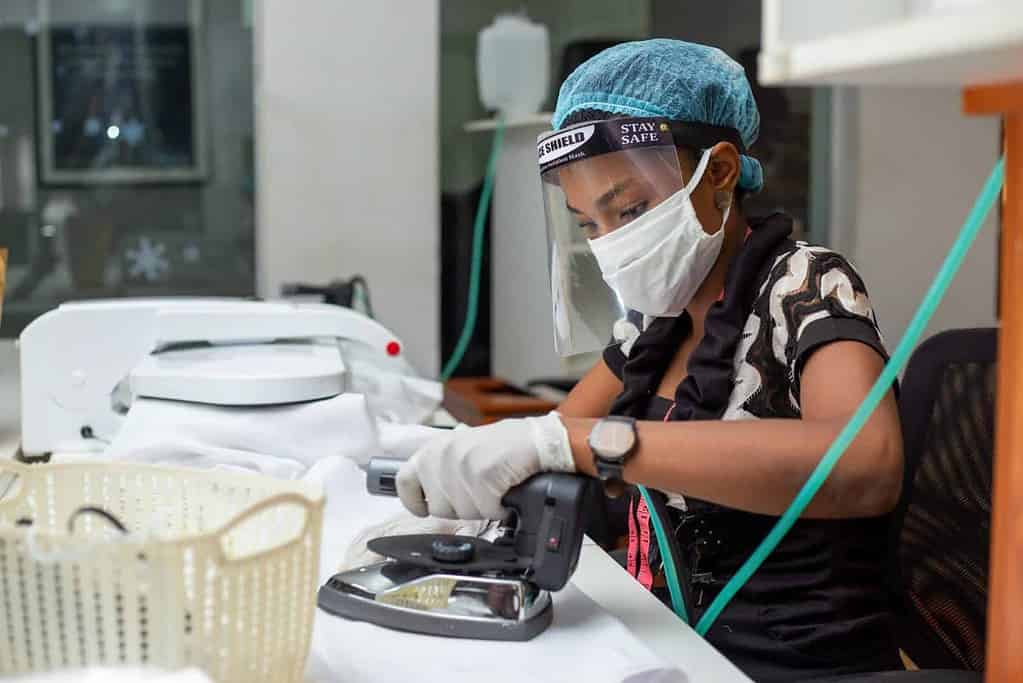Applying Acumen’s Principles to Address COVID-19

- Blog
- All Regions
As the year began, no one could have anticipated the havoc wrought by the COVID-19 pandemic. As of this writing, more than 809,000 people have died and 23.4 million have been afflicted worldwide. In the United States, low-income people and people of color have been affected in grossly disproportionate numbers. And more than 28 million Americans are now unemployed.
Since 2001, Acumen has been investing in social enterprises and enlisting Fellows to provide critical goods and services to the poor including energy, education and healthcare. To date, it’s invested more than $132 million in 136 companies, impacting 308 million low-income people in 15 countries.
Acumen invests in companies and enlists Fellows to collaborate with communities to assess needs, implement programs and achieve results.
Still, even Acumen’s impressive impactful strategies, significant funding and considerable resources can’t possibly address all of the needs of the more than 2 billion people around the world who lack access to such basic goods and services as clean water, electricity and education. And that was before the outbreak of COVID-19.
COVID’s ruthless morbidity and mortality have disrupted everyone’s daily lives. The COVID crisis disproportionately threatens the poorest and most vulnerable.
So how did Acumen change to respond to COVID-19?
It didn’t.
That’s the thing about Acumen’s approach. Acumen didn’t need to change its principles to address the COVID-19 crisis. Acumen simply had to apply them.
In her latest book, Manifesto for a Moral Revolution: Practices to Build a Better World, Acumen Founder and CEO Jacqueline Novogratz shares principles to facilitate social change. She explains that Acumen “accompanies” communities, by living and walking alongside them as “a follower as well as a guide.” This means listening to, heeding, and collaborating with others to develop and implement solutions that address their needs—even when those needs shift or increase.
So as the virus spread, Acumen started, as it always starts, by listening in order to identify and assess the most pressing problems to infuse capital in strategic initiatives to solve them.
Acumen turned to social entrepreneurs to figure out what their local communities most needed and helped them to achieve it. Acumen launched the Global Emergency Facility and the America Emergency Fund to support the work of 81 enterprises across 13 countries.
Here are just a few examples:
- LabourNet, an Acumen investee, has been building skills to train or place more than a million informal workers in India. Since the pandemic, the social enterprise has been re-purposing its 100-person staff of trainers to serve free food and provide sanitation products for 300,000 migrant workers stranded in cities without any source of income—thereby mitigating the virus’ risks of illness and death.
- Green Afro-Palms, led by an Acumen Fellow in Ghana, has been producing vegetables and palm oil from smallholder farmers. Since the pandemic, the social enterprise developed an e-commerce platform to enable 500 retailers to sell the products online—thus supporting both the vulnerable farmers and the retailers to sustain their own livelihoods as they provide access by others to critical foodstuff.
- Our Family Clinic, an Acumen investee, makes affordable, quality healthcare available 24/7 to low-income customers in southern India. Since the pandemic, the social enterprise developed a telemedicine platform to provide access to virtual care—and so helping to ensure access to healthcare during the pandemic while reducing the risk of transmission.
- The Assembly Hub, founded by an Acumen Fellow in Nigeria, offers training and upskilling for fashion designers and tailors. Since the pandemic, the social enterprise has been engaging its manufacturers to produce face masks for healthcare workers and others, and has launched support services programs for small garment businesses—consequently mitigating the risks of viral transmission while continuing to train designers and tailors and expand their skills.
Despite the risks and disruption wrought by the pandemic, Acumen hasn’t just continued its work. Acumen has been pivoting to synergistically expand the impact of its work by empowering entrepreneurs to serve those in dire need in their own communities.
Even as Acumen’s own staff and Fellows and social enterprises’ workers face their own risks of contagion, Acumen has been, as Jacqueline would say, “practicing courage” and “cultivating moral imagination.” Acumen has been leveraging its resources and increasing its investments with emergency funding not just to stay in step with its work but to step it up—to inspire and enable its entrepreneurs to serve and protect their communities. Amidst this daunting pandemic that exempts no daily need from its peril, Acumen has, as it always has, stood with and in communities to sustain, to invigorate and to empower.
And so during the COVID crisis, Acumen pivoted, it didn’t retreat. It didn’t have to retreat. Because Acumen, as Jacqueline explains, always uses “idealism as an antidote to cynicism,” recognizes “our entanglement with one another,” and steadfastly affirms that “every one of us is owed a fighting chance to flourish.”
Madeleine Schachter is an Acumen Partner, mixed media visual artist and Assistant Professor at Weill Cornell Medicine where she teaches Medical Ethics and Advanced Clinical Ethics.
She is the author of six books, including Global Social Investment: A Practical Handbook for Corporate Social Responsibility Programs on the theories and practice, pragmatic approaches, and metrics and methodological tools for impact measurement. Ms. Schachter’s work has also been published in legal and medical journals and treatises, including on global biomedical and legal ethics.
Ms. Schachter serves on the Boards of Directors of Concern Worldwide US and Autism Parents Connect.